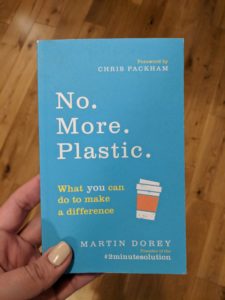No. More. Plastic. by Martin Dorey
Written by Ashley Kelmore, Posted in Reviews
Three Stars
Best for:
People looking for concrete steps to take to reduce plastic consumption individually and at the societal level.
In a nutshell:
The man who founded the two-minute beach clean-up offers tips for plastic use reduction.
Worth quoting:
N/A
Why I chose it:
I saw this in a shop while on a vacation near the sea, so it seemed like an appropriate (and quick) read.
Review:
Just over a week ago the Extinction Rebellion actions stepped up in London. The bridge by my office was occupied for a week; trains were affected, streets were blocked, and peaceful protesters engaged in civil disobedience to try to get politicians to pay attention to the serious issue of climate change and human impact on the environment. That was near the top of my mind when I came across this book. I’m doing a fairly good job with my carbon footprint; I don’t eat meat, I’m not having children. I no longer own a car, and when I did, both my partner and I still walked to work or took the bus. We do, however, live 6,000 miles from where we grew up, which means we do take long-haul flights once or twice a year.
And we also use plastic. It’s ubiquitous plastic is, especially here in the UK. The thing that baffles me the most is that nearly every bit of fresh fruit or vegetable is wrapped in plastic. Cucumbers are shrink-wrapped. Zucchini are wrapped three to a pack. Heads of lettuce aren’t that common; bags of lettuce, however, are everywhere. Broccoli crowns are shrink-wrapped. Avocado are in plastic trays. It’s BANANAS. I agree with the author here when he says it is gobsmackingly ridiculous that it is legal to sell food in packaging that cannot be recycled.
This book offers a bunch of ideas (some extremely practical, some not so much) and steps to take to reduce plastic consumption. Some I’ve done recently – buying a glass reusable water bottle and reusable coffee cup for my commute – but others are things I need to do. Each of the 30 tips are discussed in detail across one or two pages, but there is a checklist at the back so readers can keep track of their progress.
The reason this book only has three stars is it seems written in a vacuum that doesn’t acknowledge the impact of some of these suggested changes on people. For example, this guy is gung-ho on eliminating plastic straws. Now, this isn’t a thick book, nor does it contain much of a narrative. But it’s well-documented that flexible plastic straws are a necessity for some disabled people. Same for wipes, which are other things Dorey says we need to give up (or at least not flush). It would be good for society to find alternatives for people who need them, and educate people who DON’T need them to STOP USING THEM. But othering disabled people by making the request them separately or incur the added cost of buying them isn’t a solution I’m okay with.
Another suggestion is to avoid supermarkets and go to direct sources that use less packaging, like greengrocers, butchers, bakers, etc. Great idea. But if those are spread out across town, that’s a large time-suck for some people who may not have the time to give. And what about the added carbon of driving to multiple locations?
And then there’s this: “Shop as usual but leave all the packaging at the till and let the supermarket know why you’re doing it.” I’m sorry, what? You want the staff person who is likely not paid a great wage to have to clean up the mess you make with your purchases? No. Don’t do that. Talk to the manager. Get lots of people together to talk to the manager. Buy things that are not packaged and don’t buy things packaged in plastic. But don’t put it on the lowest paid staff member to deal with your actions.
It’s complicated, and makes me think about the end of Season 3 of The Good Place – things are complicated, and it can be hard to make the best, most ethical decision. And sometimes an individual doing something means very little if there isn’t a larger plan of action associated with it.
But sometimes it isn’t that complicated; sometimes you really can pay more attention and make better choices. I think, on the whole, the book is one way to help me do that.
Keep it / Pass to a Friend / Donate it / Toss it:
Keep it

